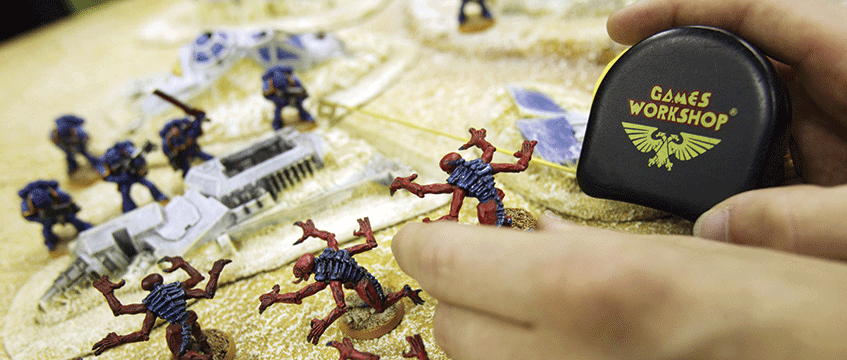The British public’s appetite for shopping on the high street might be waning, but some items continue to defy the odds. Like pasties, bakes and… miniature orcs? Yes, Games Workshop has shielded itself from the turmoil after its market cap exceeded £1.7bn – surpassing the likes of Dunelm and Dixons Carphone – and a healthy profit rise is on the cards. Meanwhile, Greggs is still on a roll too, with a profit upgrade underpinned by a 8.3% rise in like-for-like sales.
Both success stories have certainly captured Diary’s imagination. Department stores with built-in coffee shops are already familiar to UK shoppers… now just imagine a Games Workshop/Greggs mash-up. Paintbrush for your Warhammer miniatures in one hand, vegan sausage roll in the other. Living. The. Dream.
By the power of Greystar
Diary had a wonderful time bumping shoulders with Birmingham’s finest at the West Midlands Property Awards last week. Congratulations to Court Collaboration, which won Deal of the Year for its £160m forward funding at One Eastside. The project will be Birmingham’s first skyscraper, its largest build-to-rent scheme and the city’s first investment from Greystar. Though that last detail is “yet to be revealed” (cough, beyond the pages of this magazine way back on 17 August, cough). The official line has been that a “US investor” is funding the scheme. But the cat might be (fully) out of the bag now, as, when team Court took to the stage, it was joined by team Greystar.
Battle of the brands
Brand is everything, according to people considerably more business savvy than Diary. Folks like the MediaVision Insights Team, which has launched the 2019 edition of its Property Brand Report, investigating Google search volumes for more than 300 real estate, commercial, developer and online portal property brands.
Overall, alas, “brand demand was predominately down year-on-year” and, in particular, it’s a tough market for resi. “Residential leader Savills is the frontrunner with a mere 1% increase in searches,” (translating to 74,000 searches a month) MediaVision says, followed by Knight Frank and Foxtons, which each saw a loss: -5% and -12% respectively.
Gladly, commercial brands have fared better, with five of the top 10 brands on the up. WeWork will no doubt welcome some positive news that its brand is doing well online, with a “56% uplift in demand” – but the Champagne corks will really be popping at Avison Young, thanks to a 545% increase year-on-year.
Meanwhile, developers have been the only sector with substantial brand demand growth, which MediaVision welcomes as a positive sign for 2020, “showing an appetite for new property”. The biggest winner there is LiveWest – one of the newest players in the property development sector – which has shot up by a frankly astonishing 13,629%. There are YouTube influencers who would kill for those numbers.
Make love, not places
Hands up if anyone actually understands – or even likes – the term “placemaking”? It is truly awful and open to interpretation to the point of meaninglessness, from putting a piece of art in front of a building to creating a meeting place with green space and some benches (plus that piece of art).
Diary was recently speaking with one very successful maker of places about some potential new terminology we should be using in place of “placemaking”. Fresh back from a trip across the Atlantic, they told us about a Stateside development that looks great, has great tenants and, yes, boasts an outstanding piece of art. But when trying to figure out if it was actually successful as a place, someone asked: “Yes, but is anyone getting laid there?” Cue some awkward and blank faces. The answer, of course, was no… but perhaps they should be. Surely a new measure of success has been born. Every place should set our temperatures rising a little, we should all feel passionate about our surroundings and want to bring some life to it.
So, here’s an early resolution for 2020: out with the placemaking and in with the lovemaking.
Mothercare of invention
With Mothercare going down the pan, let’s take a quick look at their musical impact on the world. Yes, you didn’t misread that last part, get comfy…
— wrongtom (@TheWrongtom) November 5, 2019
Diary is perhaps at risk of becoming blasé to the collapse of the retail sector, so much so that a household name like Mothercare calling in the administrators is now met with little more than a shrug (though the fact we have never been in one may be a factor).
So huge thanks to “reggae menace, jazz vampire, film fancier” @Thewrongtom on Twitter, for reminding us that our gradually disappearing high street icons each have left their indelible mark on our culture… few, it seems, more than Mothercare.
In a lengthy, detailed and immaculately researched tweet thread, he recalls how Mothercare founder Selim Zilkha’s son Michael launched ZE Records in New York in the late 1970s, and posits that the booming baby goods chain’s profits thereby set in motion a chain of events that changed the world (or at least some of its music).
Example? ZE’s festive compilation A Christmas Record introduced the unforgettable Christmas Wrapping by The Waitresses (currently on far-too-early rotation in an increasing range of shops near you). Not only that, ZE signed Was Not Was, ultimately of Walk the Dinosaur fame (boom-boom-shakalaka-laka-boom) and was instrumental to the career of the man who co-wrote and produced the Bangles’ all-time classic Eternal Flame. As @Thewrongtom puts it, “no nappies, no flames, not even finite flames” – and we would all be the worse off for that.











